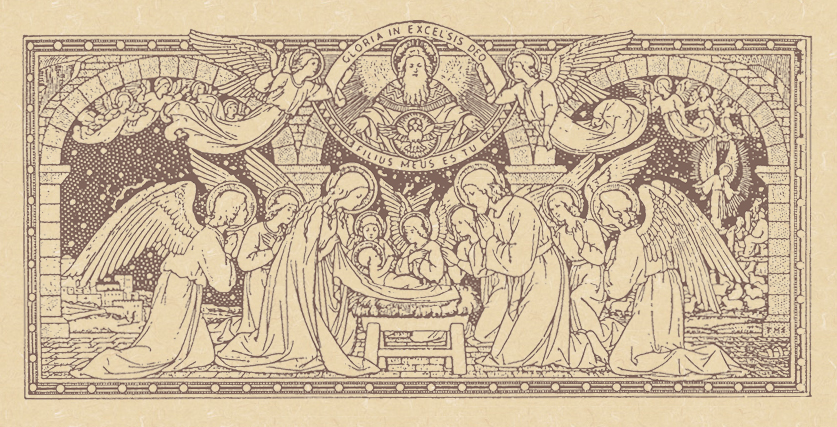

| If You Did Nothing More, It Would Suffice. [Selections from Matins.] The Second Class Feast of Saint John, Apostle & Evangelist. The Feast of St. John, Apostle & Evangelist. [In the Byzantine-Ruthenian Rite, today is the Feast of St. Stephen; a commemoration of the Evangelist is not made at Christmas time.] FatherVenditti.com |
Lesson iv. The Apostle John whom Jesus loved was a son of Zebedee, and brother of the Apostle James, who was beheaded by Herod soon after our Lord suffered. He was the last of the Evangelists to write his Gospel, which he published at the request of the Bishops of Asia, against Cerinthus and other heretics, and particularly against the then spreading doctrine of the Ebionites, who asserted that Christ had had no existence before Mary. It was therefore needful for the Evangelist to declare His Eternal and Divine Generation. Lesson v. In the fourteenth year after Nero, Domitian stirred up the second persecution, and John was exiled to the island of Patmos, where he wrote his Apocalypse, which hath been explained by Justin the Martyr and Irenaeus. When Domitian was killed, the Senate annulled all his acts, on account of his savage cruelty, and the Apostle returned to Ephesus, during the reign of Nerva. He remained at Ephesus until the time of Trajan, and founded and governed all the Churches of Asia. There, in an extreme old age, he died, in the sixty-eighth year after the Lord's passion, and was buried near the city. Lesson vi. The Blessed Evangelist John lived at Ephesus down to an extreme old age, and, at length, when he was with difficulty carried to the Church, and was not able to exhort the congregation at length, he was used simply to say at each meeting, My little children, love one another. At last the disciples and brethren were weary with hearing these words continually, and asked him, Master, why do you always say the same thing? Whereto he replied to them, [worthy of John,*] Because it is the Lord's commandment; and if you did nothing more, it would suffice.
The Church knoweth of two different lives which God hath revealed and blessed: one is the life of faith, the other the life of knowledge; one the life of this pilgrimage, the other the life of the eternal mansions; one the life of work, the other the life of rest; one the life of the journey, the other the life of home; one the life of action, the other the life of contemplation. The one escheweth evil and doeth good; the other hath no evil to eschew, and only an exceeding good to enjoy. The one striveth with the enemy, the other hath no enemies, and reigneth. Lesson viii. The one succoureth the needy; the other is where there are no needy to succour. The one forgiveth them that trespass against it, that its own trespasses may be forgiven; the other neither hath trespasses to forgive nor to be forgiven. The one is chastened with evil, lest it be exalted above measure by good; the other enjoyeth such a fulness of grace that it feeleth no evil, and cleaveth so firmly unto the Highest Good, that it hath no temptation to pride. Lesson ix. Therefore the one is good, but still sorrowful; the other is better and perfectly blessed. And of these two lives there are types, of the one in the Apostle Peter, of the other in John. The one laboureth here even unto the end, and findeth its end hereafter; the other stretcheth out into the hereafter, and in eternity findeth no end. Therefore is it said unto the one, Follow Me; but of the other, If I will that he tarry till I come, what is that to thee? Follow thou Me. What is the meaning of these words? who can know? who can understand? what is it? is it Follow thou Me, imitating Me in the bearing of earthly sorrow; let him tarry till I come again, bringing the everlasting reward?
|